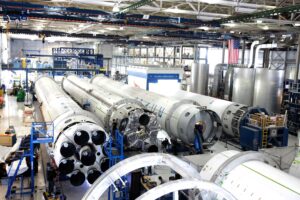Energy industry developments
It is the energy industry that plays an integral function in the powering of economies as well as shaping the environmental outcomes. With the threat of the effects of climate change and sustainability on the environment increasing, there is an organized effort to shift to more sustainable and cleaner resources for energy. This has led to an increase in developments in renewable energy as well as the gradual removal of fossil fuels.
Understanding Renewable Energy Advancements
Solar Power Innovations
Solar energy has been recognized as one of the most rapidly growing renewable energy sources due to the advancements in the field of photovoltaics and the decreasing cost in solar panels. Innovative technologies like solar roofing, bifacial panels as well as floating farms for solar have widened the possibilities of solar energy which makes it more affordable and efficient.
Wind Energy Technologies
The development of wind power is gaining momentum as an alternative to traditional sources of energy. Innovations in the design of turbines, such as taller towers, and longer blades, have greatly improved the effectiveness as well as reliability of the wind farm. Furthermore, offshore wind projects are expected to harness stronger and more consistent wind which will further increase the contribution from wind-generated energy into the energy mix.
Hydroelectric Expansion
Hydropower is among the most enduring and extensively utilized renewable energy sources, which account for a significant percentage of the world’s electricity generation. The latest developments in hydropower technology including run-of-river system and pumped storage facilities seek to increase the sustainability and flexibility of hydroelectricity, while minimizing environmental impact.
Biomass and Bioenergy Upgrades
Biomass and bioenergy technology utilize organic materials like wood, agricultural residues and organic wastes to create energy, heat and biofuels. Innovations in the process of biomass conversion like gasification and pyrolysis hold potential for improving the environmental and efficiency of bioenergy systems and contributing to a diverse and green energy portfolio.
Challenges and Solutions in Renewable Energy Adoption
Despite the impressive progress made in the use of renewable energy sources however, there are many obstacles making it difficult to make the switch.
Technological Limitations
While renewable energy technology has achieved significant progress but they face limitations in the areas of intermit entity, storage capacity along with grid connectivity. In order to overcome these barriers, they require constant research and development to increase the reliability, efficiency and scalability for the renewable energy system.
Infrastructure Requirements
The shift towards renewable energy requires significant infrastructure investment, which includes grid improvements and energy storage facilities transport networks. In order to build the infrastructure required to help a sustainable energy-based economy requires a strategic approach to planning, financial investment and collaboration between private and public stakeholders.
Policy and Regulatory Frameworks
The regulatory and policy frameworks play a key part in creating the environment for energy, and also in promoting the development of renewable energy. Globally, governments are implementing a variety of policies, like renewable energy goals, feed-in tariffs and carbon pricing, to encourage the adoption of green energy technologies and facilitate the transition to fossil fuels.

Transitioning away from Fossil Fuels
Reliance on fossil fuels carries significant economic, environmental, and geopolitical dangers, requiring an incremental shift towards more green alternatives.
Impacts of Fossil Fuel Usage
The combustion of fossil fuels for energy production is a significant cause of carbon dioxide emissions and air pollution and climate changes. Apart from environmental issues the extraction of fossil fuels and combustion has negative effects on ecosystems, public health and natural resources.
Shift towards Cleaner Alternatives
To meet these challenges, there’s growing pressure to move towards fossil-fuel alternatives and adopt more sustainable alternatives like nuclear power, renewable energy and energy efficiency strategies. Renewable energy sources have numerous benefits, such as a reduction in carbon emissions, security of energy, and employment which makes them attractive choices for investors and policymakers alike.
Economic Considerations
The shift from fossil fuels to renewable energy brings challenges and also opportunities in terms of economics. While the initial costs associated with renewable energy production might be higher than conventional fuels, the longer-term economic benefits, like lower operating expenses, more jobs creation, and a reduced dependence of imported power sources, exceed the initial investment.
Global Initiatives and Investments
Transitioning towards a sustainable energy future will require concerted efforts by businesses, governments and civil society groups around the world.
International Cooperation
Collaboration and international cooperation are crucial to accelerate the adoption of renewable energy technology and to achieve the global goals for climate change. Initiatives like that of Paris Agreement and the United Nations Sustainable Development Goals are a way to establish the framework for international cooperation in climate action and the deployment of renewable energy.
Investment Trends
The renewable energy industry has seen significant investment in recent times, fueled by a decline in costs, increased policy backing, and increasing investor enthusiasm for sustainability. Renewable energy investments cover an array of technology and applications, such as hydroelectric, solar, wind and geothermal power, which reflects the wide range of opportunities available in the market for clean energy.
Impact on Energy Markets
The growth in renewable power is changing marketplaces for energy and challenging power on fossil fuels. Renewable energy sources grow more efficient and cost-effective they are disrupting conventional energy supply chains and causing energy and utility companies to reconsider their investment models and business strategies.
Future Prospects and Trends
Looking ahead, a number of key developments are predicted to shape the direction of energy sector and further drive innovation in renewable energy technology.
Advancements in Energy Storage
Technologies for energy storage like batteries, pumps hydro as well as thermal storage play an important contribution to facilitating the integration of renewable energy sources to the grid. Continuous advances of energy storage capabilities, efficiency and affordableness are anticipated to allow the greater use in renewable sources of energy as well as increase the reliability and stability of grids.
Integration of Smart Grids
Smart grid technology leverages technology for digital communication and automation in order to maximize the generation, distribution and use of electricity. By integrating renewable energy sources as well as energy storage systems and demand-side management techniques, smart grids facilitate more flexible and efficient energy management, which reduces costs and environmental impact.
Emergence of Green Hydrogen
Green hydrogen, derived through electrolysis of renewable resources is a promising renewable and sustainable energy source to be used in a variety of applications that include industrial processes, transportation, and storage of energy. As the cost of renewable energy continues to fall and electrolyze technology become more advanced and develop, green hydrogen is likely to play an important part in reducing carbon emissions in sectors that are challenging to electrify.
Environmental and Social Impacts
The broad adoption of renewable energy can bring substantial social and environmental benefits, resulting in the mitigation of climate change sustainable development, as well as an improved quality of life.
Climate Change Mitigation
In addition to reducing the use of fossil fuels and decreasing greenhouse gas emissions, renewable energy helps to mitigate the effects of climate change as well as limit global warming. Switching into renewable energies is vital to achieve the goals that are part of the Paris Agreement and avoiding the most devastating impacts of climate change such as extreme weather storms, sea-level rise and loss of biodiversity.
Job Creation and Economic Development
The renewable energy industry is an important source of employment creation and economic growth, providing opportunities for investment, job creation and development across a variety of community and industries. From construction and manufacturing as well as research and development the renewable energy industry boosts economic growth and strengthens local economies, especially in areas of rural or disadvantaged.
Community Engagement
Participation and engagement of the community are vital to the longevity and viability in renewable energy-related projects. Through involving local residents in the development, planning and implementation of renewable energy initiatives developers of projects can build trust, address issues, and increase the economic and social advantages for communities that host the renewable energy facilities.
Conclusion
In the end the energy sector is experiencing a major change that is characterized by rapid advances in renewable energy technologies as well as the shift away from fossil fuels. While substantial advancements have been made in the use of renewable energy but there are challenges to overcome with regards to technological limitations, infrastructure needs as well as policy support. With continued development as well as investment and collaboration and collaboration, an energy-efficient future for the planet is attainable and will bring significant economic, environmental and social benefits for the future and present generations.
What are the most recent developments regarding renewable power?
Recent advancements in renewable energy have included technological advances in solar power including solar roofing and bifacial panels and also improvements in the design of wind turbines as well as offshore wind turbines.
How can renewable energy contribute to reducing climate change?
Renewable energy helps to replace fossil fuels, and also reduces greenhouse gas emissions, assisting to slow the effects of climate change and limiting the rise in global temperatures.
What role do policies play in encouraging renewable energy?
Policies, like Renewable Energy Targets and Incentives play an important role to encourage investments in renewable energy as well as driving the move towards a move away from fossil fuels.
What are the financial benefits of switching to renewable energy?
Switching to renewable energy provides economic benefits, including employment generation, increased energy security and less dependence of imported fuels. This is far more beneficial than the initial costs involved in deploying.
What are the benefits for communities from projects to generate renewable energy?
Communities can reap the benefits of renewable energy projects via the creation of jobs economic development, job creation, and involvement of the community when all stakeholders are included in the making of decisions and planning processes.

